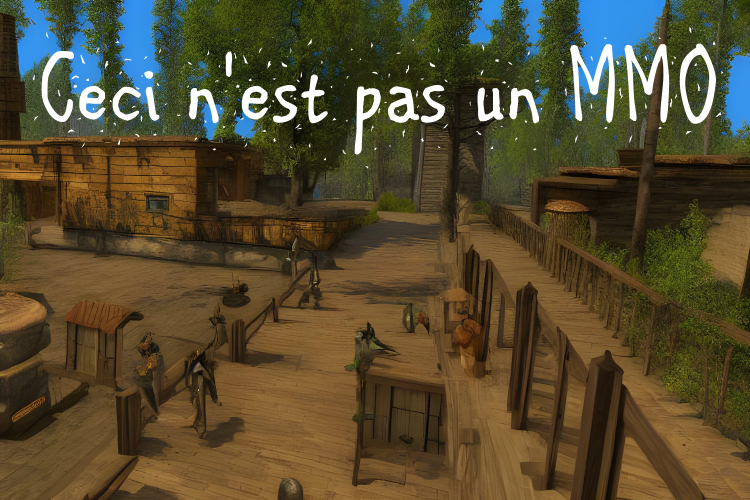Since I ran out of credits for the month at Dall-E 2, I’ve been using Midjourney. Tonight, I went to Stable Diffusion, which is free and only took a dozen tries to make something that looks like it might have come from an MMO.
There’s some questions over yesterday’s post over my definitions of an MMO. So today, I want to explain what I mean when I use the term. I’ve changed what I think of, of an MMO, since I started playing them. And the official definitions are all over the place.
Anyway. Topology. Imagine a super stretchy substance. If you have a shape made of this stuff, and you can stretch it to form another shape — say, make a cube into a sphere — those things are topologically identical. But you couldn’t make a cube into a donut; the stuff is stretchy, not sticky, so a cube and a donut are topologically different. Okay?
To make a definition of an MMO, we need to say what elements are of an MMO, and then apply it to any specific game and see if that qualifies.
One dictionary defines MMORPG as “an online role-playing video game in which a very large number of people participate simultaneously.”
There’s a bunch of concepts in there they don’t define. Role-playing? You take on a role? Call of Duty does that. Very large number of people participate? Yeah, millions of people play COD at the same time. Is Call of Duty an MMO? By this definition, it is. It is topologically identical.
Another definition says an MMO is a game where you “traverse a virtual world, complete quests, earn rewards, and interact with other players.” All those things are in Call of Duty. Every single one of them. Still no donut hole.
Yet another definition: “any story-driven online video game in which a player, taking on the persona of a character in a virtual or fantasy world, interacts with a large number of other players.”
My son plays Call of Duty a lot. There’s a lot of story going on. Nazi scientists triggering extraplanar zombie invasions was one plot he played a lot. Well, that sure sounds like a story. As you worked through the missions, you saw more of the story. Virtual or fantasy world? Yeah. Interacts with a large number of other player?
This is why I brought up the topology thing. How many players does a MMO player really interact with? Most times when I play FFXIV, the number of players with whom I interact is zero. If I join a 24 person raid, then that number is 23. I don’t think you can get 24 people in the same COD instance at the same time, but for sure, you can in Fortnite. You can get a hundred people together in that one, which would be a pretty decent night for an EverQuest server these days. (But EverQuest would be an MMORPG even if only one person was logged in — even if none were.)
Another definition: “MMORPG refers to games that feature millions of players occupying the same game world.” Yeah, this isn’t true for EverQuest, which is an MMO. I’m pretty sure no game has millions of players occupying the same game world.
So let’s make a new definition
But before I do that, why does it matter how broadly we define an MMO? If we start excluding games, we run the risk of mummifying the whole genre. On the other hand, if every online game is an MMO, there’s no meaning to it. I kinda bristle when every other single player on Steam is called a roguelike. No it’s NOT. But that’s fine, as there is a definition of what is a roguelike, the Berlin interpretation.
It’s not a checklist. It’s a list of high value items and low value items, and if you have enough of them, maybe you’ve got a roguelike. But in the annual 7DRL game jam, the bar is, “do you honestly think your game is a roguelike?”
So a game is an MMO if it says it is? Well, Minecraft does not say it is an MMO, but it clearly is by any measure.
- A world you can explore. The world isn’t different every time you log in. An explorable world is, to my mind, the number one quality of an MMO. It can be fantasy, realistic, SF, doesn’t matter. You can explore it.
- Multiplayer. I don’t think the original definition of “massively” meant millions. I think it meant hundreds. There have been MMOs that I doubt ever had more than a dozen players at a time, if that — I’m thinking the Love MMO, for one. The people with whom you interact should definitely have the possibility of being a stranger.
- Friend list. Call it a guild, friend list, or whatever. You should have some way of playing with people you meet more than once.
- Online. Well, yeah.
- The ability to chat. This is a big one. You have to be able to get to know your fellow players.
- Character customization. I’ve played a bunch of MMOs where you just picked your character from a list, based on class. They all looked the same, maybe the gear was different. These were typically 2D MMOs and were more like arcade games. You should at least be able to pick your name, and you should be able to make your character look different than everyone else’s characters.
- Story? This comes up a lot. Early WoW had a lot of stories that were mostly self-contained. Early EverQuest had somewhat fewer stories, and they were typically pretty short. Both were mostly told through quests.
- Fishing. I’ve heard it said that all real MMOs let you go fishing.
Is COD an MMO? Well, no, the world isn’t explorable. Is Dungeons & Dragons Online an MMO? No, because the world is not explorable; it’s all instanced. It calls itself an MMO, though.
Now all that’s left is to assign point values to all those things, add them up, and set an over/under point total that determines if it is an MMO or not. But for now, I just want to know if my list makes sense, and then I can figure out if Fortnite and COD are MMOs, and if DDO still makes the cut.





Fishing! That’s the secret sauce! Secret FISH sauce.
I like your approach because the other examples you provided were all given by the source as a pithy attempt to reduce a broad concept down to an elevator pitch, which is inherently generic enough in this case to capture a whole lot of games, vertently or inadvertently. Maybe finding the parts of a traditional MMO which are NOT represented in titles like COD could help as well, although that might end up as a massive list when ANOTHER game is discovered that needs to be excluded.
That’s the thing about the Berlin Interpretation. It’s a list of elements often found in roguelikes in order of importance. But the blithe interpretation of MMORPG as an online game with a lot of players is just plain wrong. MMO-ness is not conferred by the number of players. I’m convinced that exploration is the key, along with a non-instanced world in which it is possible to meet other players whom you don’t know.
Why do I believe Minecraft is an MMO, and Valheim is not? I need to keep thinking about this.
This is just a starting point.
I am firmly convinced that a persistent, shared world, an extension of your explorable world, is a key difference between an MMO… a term which has come to mean simply an online, server based, multiplayer title like COD… and an MMORPG.
I spent some time trying to make AIs come up with a definition at one point.
https://tagn.wordpress.com/2023/04/16/answering-gaming-questions-with-ai-mmos-vs-mmorpgs/
“Pesristent virtual, shared world” is my go-to definition for MMORPG, near enough, but it’s not quite as straightforward as that. MMO is a lot easier. It’s any online game that allows more people to play it than a “Co-op” game does. Online games are all either single-player, Co-op or MMO. I don’t think there are any other commonly-used variations.
I don’t play co-op games but from what I read , they usually seem to be designed for about four people. The other way of expressing it might be any game that allows several people to play at the same time without having to arrange their log-ins through some co-ordinated process, I guess, but again, it’s not my thing so I’m guessing. I’m not sure that a game where you all logged in separately and did nothing together would be “co-op” even if the max capacity was four people, so maybe you can have a four-person MMO…
If we’re going to get into quasi-mathematicaly defined parameters for MMORPGs, though, first you’d need to define “RPG” and no-one’s been able to do that yet. It certainly has nothing to do with playing a role, any more than “catching a bus” means being able to hold one in your hand. These days it seems to be mostly about specific progression systems and mechanics and again almost all games seem to have those now, so that doesn’t help much.
“MMORPG” isn’t really an acronym any more, that’s the problem with the definition. It’s just a tag. It applies to a certain kind of game in the same way “lo-fi” or “synthcore” apply to certain kinds of music. People who are into musical sub-genres just know their sound when they hear it but they can’t adequately explain the differences between what they’re hearing and other songs that sound pretty much the same to non-genre fans or frequently even to other fans of the same sub-genres. In the same way, individual MMORPG players “know” what an MMORPG is but the same MMORPG players argue with other MMORPG players about what counts and what doesn’t in the same way as medieaval scholars allegedly argued over angels and pinheads.
I don’t believe any of this is even remotely amenable to quantative analysis.
I mean, that was where I started. “I know one when I see one”. BUT! The developers of some online games call them MMOs, and I wonder if they really are.
Persistent, shared world is a nice definition. I see the AIs had their chance to weigh in. I don’t agree that MMO is any different from an MMORPG; MMO is just an abbreviation for an acronym. COD is an online shooter. D4 is an ARPG. Both those definitions overlap a lot, especially with D4. If I had to narrow my definition, I would require that the game world would be persistent, shared, and designed to support more than a hundred people at one time.
EQ was about 500 people on one server at one time. I don’t know about WoW and FFXIV, but it’s the kind of thing that gets exponentially worse with more players, so I wouldn’t be surprised if it were about the same. I’d be comfortable with saying at least 500 people at one time, and they could interact with one another in some way. EQ wouldn’t let that many people in one zone at a time but you could chat.
Ten years I would have agreed and used MMO and MMORPG synonymously. But the gaming press has eroded the meaning of MMO so that is now pretty much means, in the minds of many, an online title hosted by the company. World of Tanks, War Thunder, Diablo III, they all get the MMO moniker even though the they are lobby games with no real world where you can only interact with a very minimal subset of the players.
I would like the push back the tide, but I also want people to know what I mean.
I think many if not most online multiplayer games have become MMOs in the broad sense. To me MMORPG is a narrower concept, and seems to overlap with your definition of MMO a lot more.
To me what distinguishes a MMO from a MMORPG is not really any particular mechanics but a design sensibility. If the one of the central design goals is to create the illusion of a shared fantasy world (or fictional world in general), with at least some of the expected entertainment coming from social interactions with other avatars being run by players (even if indirect like an AH or looking at outfits when you run through town) it’s a MMORPG. It’s more of a “I know it when I see it” than a hard limit, and any two observers might disagree on the edge cases. But if there is a straight line in the design history from the game to UO or EQ (or a MUD) I consider an MMORPG.
To me DDO and Guild Wars 1 are edge cases, because the only areas that aren’t instanced are villages, cities and keeps that lead either directly to quest instances or to wilderness areas that lead to more quest instances. However a major design goal is to create the illusion of a shared world inhabited both by yourself and other PCs, so I tend to include them. Diablo I-III don’t really count in my mind because you can get to the hub areas offline. It’s by design that you don’t have to fool with other players if you don’t want to (same with PSO). A lot of survival games like Arc would count except there are innumerable copies of the game, and again seeing other players running around or not is completely your choice. A particular server that always has a lot of players comes real close to being a MMOPRG for sure though, especially if it has more active players than can be logged on at once.
Second Life is another edge case, but I wouldn’t include it because the design goal is not to create the illusion any specific fictional world. Location based games are yet another edge case, but I don’t include them because our world is so integral to them (I am on pretty shaky ground there with Orna or Magic Streets I will allow). I consider LBGs in general something new.
RPG is also a necessary part to me, but almost everything seems to have some RPG mechanics such as XP and levels these days, so it’s not all that useful by itself. But in what I think of as a MMORPG the mechanics are there at least in part to help make the world feel more fleshed out, kind of like in a PnP RPG. They aren’t there purely to give players more things to grind towards.
All this is a very long winded way of saying I consider MMORPGs a specific genre with fuzzy edges. We pretty much all agree on what’s in the middle, and will probably never agree about where the exact edges are. Whatever it is though, they are a lot more enchanting and sticky to me than almost any other type of game. They have a magic that really makes them pop for me.
OK, that looks like a blog post now . . . Not going to retype it, but I will repost it and polish it a bit
Guild Wars was pretty much a single player game. You’d leave town with your band of NPCs and do the thing and then return. I never considered it an MMO, at least in PvE. I never was in a guild and never participated in the PvP. I just jaunted around alone until I got bored with it. GW2 is, of course, a far more standard MMO.
Second Life is a social space. It’s not a game at all, though people make games in it. It’s just one of the social spaces in a long line from the original Habitat for the C64 to VR Chat today.
Character progression is a fuzzy metric. Is getting better gear, progression? Yes. Is unlocking new skins progression? Yes. Character progression is the game rewarding you for playing, so that you’ll play again for more rewards. This is actually, I think, why I bounced off of GW2. I don’t think I have gotten any new gear in years. It all seems to have the same stats, just different looks. (For that matter, I have no idea if anything I do in GW2 has any effect on what we’re doing. My damage seems non-existent, my heals seem non-existent, I have no idea what I am doing in that game and I have been max level for over a decade).
Different subject. I do think character progression of whatever sort is important so that newbies can ooh and aah over the veterans. The vets feel good about their time in the game and the newbies want to work to get that cool. I think the MMO devs can be super creative with what form that progression takes. If you’re in a mobile game, it’s loot boxes. Scummy, but still progression.
The later Guild Wars expansions skewed more single player, but the base game was a heck of a lot easier in a party. In fact I got stuck on one mission when I played through it recently because I couldn’t handle it with my hirelings.
That said, in the modern game for sure you will be doing most missions solo with hirelings. However, the starter areas still tend to be pretty lively with other players, which I think is impressive for such an old game that never had a huge audience. I expended on this more when I turned it into a blog post, but one key to me is that you can’t play the game offline or without running the risk of running into strangers. You have to log into the servers and in the shared spaces you will see other people. I think the fact that Guild is right in the title does also hint that they intended it to be at least somewhat of a social experience.
But again, it’s an edge case to me, and I certainly see where you are coming from.
Reading through all of this again, I feel like we agree that online shared world with a lot of players able to all exist in the same place and interact is a key component.
You and I disagree on how much of the world needs to be shared, and more specifically whether it counts if only some social spaces that lead to the adventuring areas are shared. For me they count if you can’t play the game at all offline, so you have to run through those shared social spaces to get to the gameplay. That makes socializing, even if only a bit, a core element of the design.
Your point of view that the actual core gameplay needs to take also place primarily in areas that aren’t instanced also certainly makes sense to me. It’s just that DDO “feels” like a MMORPG to me when I play it. GW1 does as well, but to a much lesser extent.